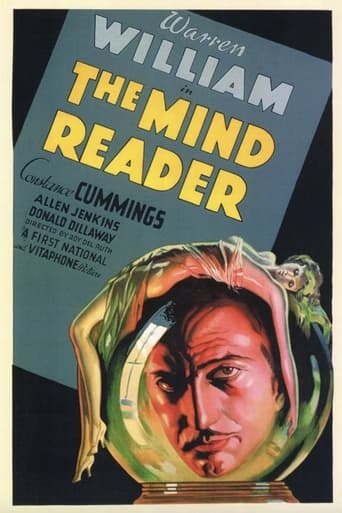mark.waltz
Of course, most (if not all) mind readers are phony, and that is definitely the case with Warren William here, playing one of his most notorious scoundrels. He's a second-rate carny medicine man salesman who sees a mind reader at work and decides to get in on the scam. At first doing a tacky mind reading act, he's soon the toast of women's society, finding out the scoop on various men cheating on their wives and this leads to a confrontation by one of the husbands and a struggle for a gun that leads to the man's death. Constance Cummings, cast as his naive wife, happens to be a friend of one of the socialites with a cheating spouse, and arrives at William's office, unaware that the notorious society psychic is in fact her own husband. She's held for his murder as William disappears, but when his conscience takes over and she lies ailing in a prison hospital, he must make a life-changing decision that could bring on either atonement or damnation.One of the premiere scoundrels of the pre-code era of Hollywood cinema, Warren William was the George Sanders of his day. He played either likable, dashing schnooks or borderline criminals, all on the take, all after women (married or not) and all morally reprehensible. His right-hand man (Frank McHugh) stands by him through thick and thin, and he even has a black assistant (Clarence Muse) who arranges for allegedly burnt questions from the audience to flow down a tube to McHugh who then reads them into a small microphone which only William can here. There's a very haunting scene featuring Mayo Methot (at one time the wife of Humphrey Bogart) as a victim of William's phony mind reading who tells him off then takes drastic measures to deal with the fall-out of his incorrect advice. Natalie Moorehead has one great scene as one of the society women William utilizes in his schemes to rise to the top of his racket.Somewhat disturbing due to the lack of scruples of the leading character, this is still fascinating because of the no-holds barred way it reveals his rise, fall and come-uppance. McHugh gets a hysterical line in the final scene which pretty much sums up the irreverent way in which the characters liked to live their heinous lifestyles. Some great art direction and a truly snappy screenplay are aided with the direction of Roy Del Ruth. In spite the implausibility of how Cummings comes to discover her husband's betrayal and her ridiculous naiveté over it all, this is pre-code drama at its finest. William shows that he's more than just dashing window dressing for the great ladies of Warner Brothers' golden age (Bette Davis, Kay Francis, Joan Blondell to mention a few) and that with the right part, he was truly one outstanding actor.
Neil Doyle
WARREN WILLIAMS stars as a man who is a charlatan mind reader, eventually redeemed by the good woman who becomes his wife--and who remains loyal to him even after she learns that he has returned to his old ways while making her believe he has a respectable job. Constance Cummings does a nice job as his love interest.It's a sort of time capsule for the way things were back in 1933. Allan Jenkins does a standout job as the charlatan's foil, closing the film with a line delivered in tough Jenkins style: "Too bad you're going to the slammer just when drinkin' is okay again." A fast moving little programmer, easy to watch and just as easy to forget.Trivia: Watch for Humphrey Bogart's first wife, Mayo Methot, as an overwrought young woman who lashes out at the charlatan before jumping into an open elevator shaft.Another point of interest for me: The romantic theme played beneath much of the tender dialog between Constance Cummings and Warren Williams is the dance theme used years later in TO EACH HIS OWN ('46). I always thought Victor Young was the creator of that dance theme, but apparently not. The score here is listed by IMDb as an original one.
David (Handlinghandel)
Warren William turns in a superb performance. Allen Jenkins, always fun if a bit tedious in later comic gangster tales, does fine. The fine black actor Clarence Muse is given a meaty role and does beautifully by it. And Constance Cummings, whom I saw several decades after this in a magnificent performance on Broadway, is excellent.This is a dark, twisting tale. William is a grifter who's tried a few rackets before he hits on mind reading. He and Jenkins pull some shady business in Cummings's hometown (emphasis on town) but she falls for him. She thinks he's the real thing, for a while, and he tries hard to go straight for her.There is no wrong move. It's taut and disturbing. Roy del Ruth was a sensationally good director at this time, though this is darker than what he generally worked with.No happy Hollywood ending is slapped on. William is seen about to pay for his evil ways but it sure doesn't look as if he is going to get a last-minute reprieve, nor does he seem particularly changed in his soul.Keep an eye out for this one!
clemd
William Warren plays a fraud who must choose between his girl and his fraudulent - but lucrative - profession. Interesting use of crooked camera angles to depict crooked dealings. Warren displays a wider acting range than in other movies.


